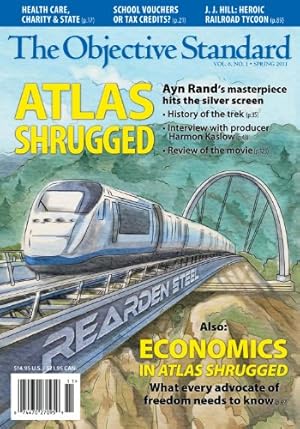Share This
Description
The Spring 2011 issue (Vol. 6, No. 1) features the following articles and reviews:
• An Interview with Atlas Shrugged Movie Producer Harmon Kaslow
• Atlas Shrugged's Long Journey to the Silver Screen, by C. A. Wolski
• Economics in Atlas Shrugged, by Richard M. Salsman
• James J. Hill and the Great Northern Railroad, by Talbot Manvel
• Walt Disney's EPCOT: The City of Tomorrow that Might Have Been, by Gretchen Thomas
• A Symphony of History: Will Durant's The Story of Civilization, by Dan Norton
• Around the World: "The Communist War against the Philippines and Why It Rages On", by Joshua Lipana
• Health Care and the Separation of Charity and State, by Paul Hsieh
• Toward a Free Market in Education: School Vouchers or Tax Credits?, by Michael A. LaFerrara
• Atlas Shrugged: Part I, reviewed by C. A. Wolski
• The King's Speech, reviewed by C. A. Wolski
• Leaving Johnny Behind (Anthony Pedriana), reviewed by Laura Hilse
• Terrorist Hunter (Anonymous), reviewed by Daniel Wahl
• The Philosophical Breakfast Club (Laura J. Snyder), reviewed by Roderick Fitts
• The Sleuth Investor (Avner Mandelman), reviewed by Daniel Wahl
The Objective Standard is a quarterly journal of culture and politics written from an Objectivist perspective (Objectivism being Ayn Rand's philosophy of reason, egoism, and laissez-faire capitalism). The journal is based on the idea that for every human concern -- from personal matters to foreign policy, from the sciences to the arts, from education to legislation -- there are demonstrably objective standards by reference to which we can assess what is true or false, good or bad, right or wrong. The purpose of the journal is to analyze and evaluate ideas, trends, events, and policies accordingly.
We maintain that the standards of both knowledge and value derive from the facts of reality; that truth is discovered only by means of reason (i.e., through observation and logic); that the factual requirements of man's life on earth determine his moral values; that the selfish pursuit of one's own life-serving goals is virtuous; and that individual rights are moral principles defining the fundamental requirements of a civilized society.
We stand opposed to the notion that the standards of knowledge and value are not factual but subjective (feeling-based) or other-worldly (faith-based); that truth is ultimately dictated by majority opinion or a "supernatural" being's will; that democratic consensus or "God's word" determines what is moral; that sacrifice for "the common good" or in obedience to "God's commands" is virtuous; and that rights are social conventions or "divine decrees."
In stark contrast to these philosophic approaches, ours is a philosophy of reality, reason, egoism, and laissez-faire capitalism.
Tag This Book
This Book Has Been Tagged
Our Recommendation
Notify Me When The Price...
Log In to track this book on eReaderIQ.
Track These Authors
Log In to track C. A. Wolski on eReaderIQ.
Log In to track Craig Biddle on eReaderIQ.
Log In to track Dan Norton on eReaderIQ.
Log In to track Gretchen Thomas on eReaderIQ.
Log In to track Joshua Lipana on eReaderIQ.
Log In to track Laura Hilse on eReaderIQ.
Log In to track Michael A. LaFerrara on eReaderIQ.
Log In to track Paul Hsieh on eReaderIQ.
Log In to track Richard M. Salsman on eReaderIQ.
Log In to track Talbot Manvel on eReaderIQ.
